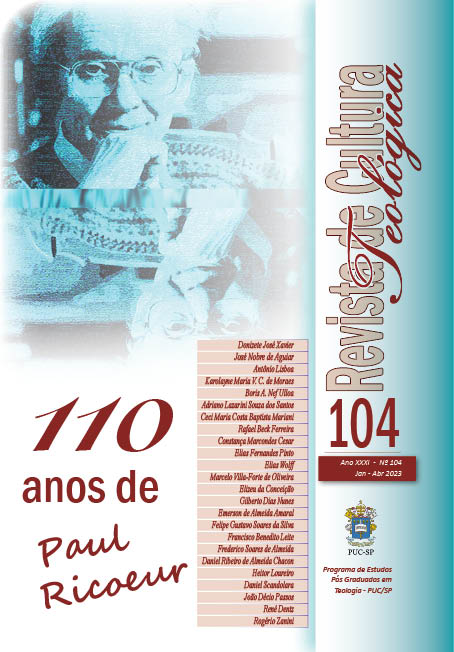Inclusão, reconhecimento e gratidão:
uma leitura pragmalinguistica de Lc 17,11-19
DOI:
https://doi.org/10.23925/rct.i104.60782Palavras-chave:
Evangelho segundo Lucas, Pragmalinguística, Comunicação, Inclusão, SalvaçãoResumo
O artigo apresenta uma abordagem pragmalinguística de Lc 17,11-19. Esta metodologia exegético-hermenêutica sincrônica sublinha a perspectiva comunicativa gerada no encontro texto-leitor, à qual se coaduna a compreensão das Escrituras, evento literário, enquanto revelação de Deus expressa em palavra humana. Os campos semânticos destacam a força comunicativa do relato, mediante suas estratégias literárias e pragmáticas. Na primeira parte do artigo, identifica-se a relação da perícope com a macronarrativa do evangelho lucano. A perícope encontra-se na seção da grande viagem de Jesus a Jerusalém (9,51-19,27). Os milagres possuem, nesta seção, função parenética sobre o discipulado cristão e manifestam a missão salvífica de Jesus. Na segunda parte do artigo, sublinham-se os elementos que explicitam a coerência comunicativa do relato. A articulação textual revela que a purificação dos leprosos e o reconhecimento expresso pelo samaritano configuram-se como sinais da presença do Reino manifestos no ministério de Jesus. Finalmente, indica-se a focalização pragmática, que abre novos horizontes de sentido para o leitor: o desafio da inclusão do “diferente” na comunidade cristã, o louvor a Deus e o agradecimento pelo dom recebido, as dimensões imprescindíveis de compaixão e misericórdia frente aos sofredores, o caráter inclusivo da eleição de Israel e o universalismo da salvação.
Referências
ALETTI, J-N. El evangelio de Lucas y las Escrituras de Israel: la importancia de la tipología em Lucas. Navarra: EVD, 1999. (epub).
ASCOUGH, R. Milagres de Jesus. 2.ed. São Paulo: Editora Ave-Maria, 2008.
BENTO XVI. Exortação Apostólica pós-sinodal Verbum Domini. 2.ed. Brasília: Edições CNBB, 2011. (Documentos Pontifícios 6).
BERGER, K. Pode-se crer em milagres? São Paulo: Loyola, 2003.
BERLEJUNG, A.; FREVEL, C. Dicionário de termos teológicos fundamentais do Antigo e do Novo Testamento. São Paulo: Loyola, 2011.
BOVON, F. El Evangelio según San Lucas III: Lc 15,1-19,27. 2.ed. Salamanca: Ediciones Sígueme, 2016. (Biblioteca de Estudios Bíblicos 87).
CASALEGNO, A. Lucas: a caminho com Jesus missionário. São Paulo: Loyola, 2003.
COLAVECCHIO, R. Jesus e a comunidade do Reino no Evangelho de São Lucas. 2.ed. São Paulo: Loyola, 2013.
CONCÍLIO VATICANO II. Constituição Dogmática Dei Verbum (18/11/1965). In: COSTA, L. (org.). Documentos do Concílio Ecumênico Vaticano II (1962-1965). São Paulo: Paulus, 1997.
DILLMANN, R.; MORA PAZ, C. Comentario al Evangelio de Lucas: um comentario para la actividad pastoral. Navarra: EVD, 2006. (Evangelio y cultura 2).
ETUKUMANA, G. Reconciliation in the Gospel of Luke: a socio-historical study. 2016. Tese de Ph.D. Stellenbosch University, Stellenbosch (África do Sul), 2016. Disponível no site: < http://scholar.sun.ac.za/handle/10019.1/100023>. Acesso em 08/10/2022.
FABRIS, R.; MAGGIONI, B. Os Evangelhos (II). São Paulo: Loyola, 2006. (Bíblica Loyola, 2).
FAUSTI, S. Uma comunidade lê o evangelho de Lucas. 1.ed. Brasília: Edições CNBB, 2021. Coleção Leitura Pastoral da Bíblia.
FRANCISCO. Homilia no Jubileu Mariano (09/10/2016). Disponível no site: <https://www.vatican.va/content/francesco/pt/homilies/2016/documents/papa-francesco_20161009_omelia-giubileo-mariano.html>. Acesso em 26/09/2022.
GARCÍA, S. Evangelio de Lucas. Biscaia: Desclée de Brouwer, 2012.
GARLAND, D. Zondervan exegetical commentary series on the New Testament: Luke. Michigan: Grand Rapids, 2011.
GREEN, J. The gospel of Luke. Grand Rapids: Eerdmans, 1997.
GREEN, J.. The theology of the Gospel of Luke. 16 ed. Cambridge: Cambridge University Press, 2013.
GRILLI, M.; GUIDI, M.; OBARA, E. Comunicação e pragmática na exegese bíblica. São Paulo: Paulinas, 2020. (Cultura bíblica).
JOHNSON, L. Il Vangelo di Luca. Torino: Editrice Elledici, 2004. (Sacra Pagina vol. 3).
KARRIS, R. J. O Evangelho Segundo Lucas. In: BROWN, R.; FITZMYER, J. A.; MURPHY, R. E. (Orgs.). Novo Comentário Bíblico São Jerônimo. Novo Testamento e Artigos Sistemáticos. São Paulo: Academia Cristã / Paulus, 2015.
KÜMMEL, W. Introdução ao Novo Testamento. 4.ed. São Paulo: Paulus, 1982.
MARCONCINI, B. Os evangelhos sinóticos. São Paulo: Paulinas, 2001.
MARGUERAT, D. O evangelho segundo Lucas. In: MARGUERAT, D (Org.). Novo Testamento: história, escritura e teologia. São Paulo: Loyola, 2015. p. 107-135.
MASINI, M. Luca: il Vangelo del discepolo. Brescia: Queriniana, 1997.
MAZZAROLO, I.; KONINGS, J. Lucas: o evangelho da graça e da misericórdia – comentário-paráfrase. São Paulo: Loyola, 2016.
MENDONÇA, J. A leitura infinita: a Bíblia e sua interpretação. 1.ed. São Paulo: Paulinas; Pernambuco: Universidade Católica de Pernambuco, 2015. (Coleção Travessias).
MESTERS, C.; OROFINO, F. Crescer em amizade: uma chave de leitura para o evangelho de Lucas. São Paulo: Paulus, 2019 (Coleção A Bíblia e o povo).
MILLOS, S. Lucas. Barcelona: Editorial Clie, 2017.
MONASTERIO, R. A.; CARMONA, A. R. Evangelhos sinóticos e Atos dos Apóstolos. São Paulo: Ave-Maria, 2000. (Introdução ao Estudo da Bíblia, 6).
MORA PAZ, C.; GRILLI, M; DILLMANN, R. Lectura pragmalinguística de la Biblia: teoría y aplicación. Navarra: EVD, 1999. (Coleção Evangelio y Cultura 1).
NEF ULLOA, B. A presença dos samaritanos na obra lucana. Disponível em:<http://www.lambda.maxwell.ele.puc-rio.br/21666/21666.PDF>. Acesso em 18/12/2022.
NOLLAND, J. Luke 1–9:20. Michigan: Zondervan, 2000. (World Biblical Commentary, 35b).
PARSONS, M. Luke. Michigan: Baker Academic, 2015. (epub).
PIKAZA, J. A teologia de Lucas. 2.ed. São Paulo: Paulinas, 1985.
ROSSÉ, G. Il Vangelo di Luca: commento esegetico e teologico. 3.ed. Roma: Città Nuova, 2001.
ROSSI, L.; SILVA, V. (orgs.) Milagres na Bíblia. São Paulo: Paulus, 2017.
SANTOS, N. A esperança que Jesus dá: uma reflexão sistemática sobre a esperança e o ‘seu’ tempo a partir da exegese dos encontros com Jesus narrados nos evangelhos. Tese de Doutorado. Coimbra: Simões e Linhares Ltda., 2018.
SCHNELLE, U. Introdução à exegese do Novo Testamento. São Paulo: Loyola, 2004. (Bíblica Loyola, 43).
SCHWEIZER, E. Il Vangelo secondo Luca. Brescia: Paideia Editrice, 2000.
SILVA, C. Metodologia de exegese bíblica. 3.ed. São Paulo: Paulinas, 2009.
SIMIAN-YOFRE, H. Metodología del Antiguo Testamento. Salamanca: Ediciones Sígueme, 2001.
STEIN, R. Luke. Nashville: B e H Publishing Group, 1992. (The New American Commentary, vol. 24).
WOLTER, M. The Gospel According to Luke: Volume II (Luke 9:51-24). Texas: Baylor University Press, 2016.`
Publicado
Como Citar
Edição
Seção
Licença
Copyright (c) 2023 Revista de Cultura Teológica

Este trabalho está licenciado sob uma licença Creative Commons Attribution-NonCommercial-NoDerivatives 4.0 International License.
Os autores concedem à revista todos os direitos autorais referentes aos trabalhos publicados. Os conceitos emitidos em artigos assinados são de absoluta e exclusiva responsabilidade de seus autores.

